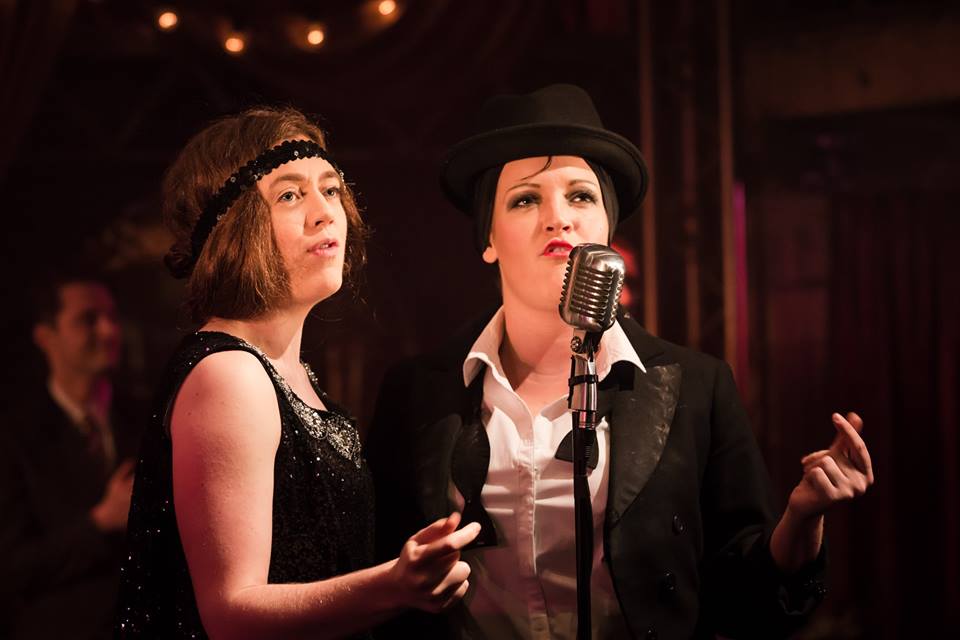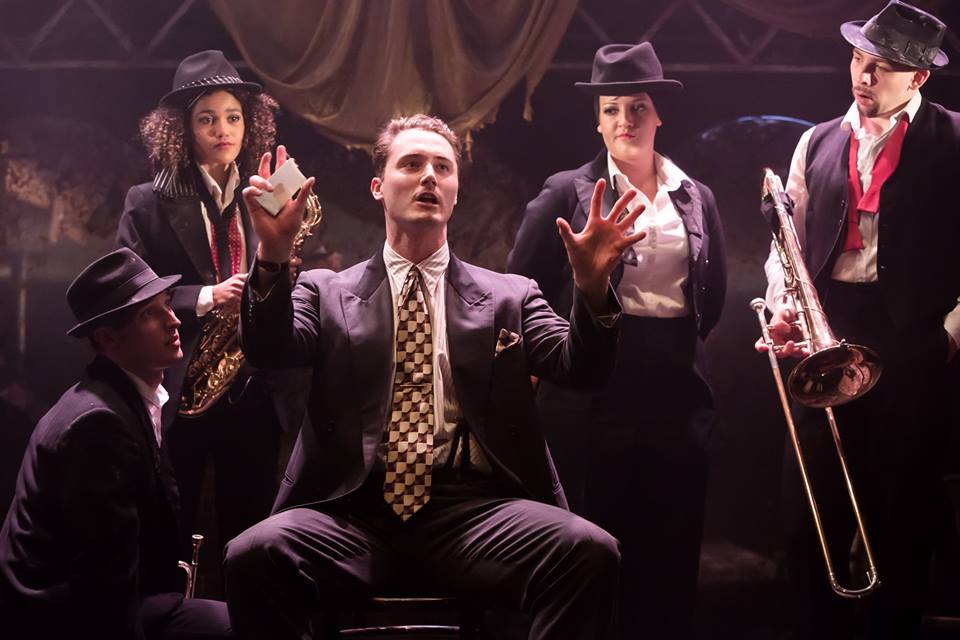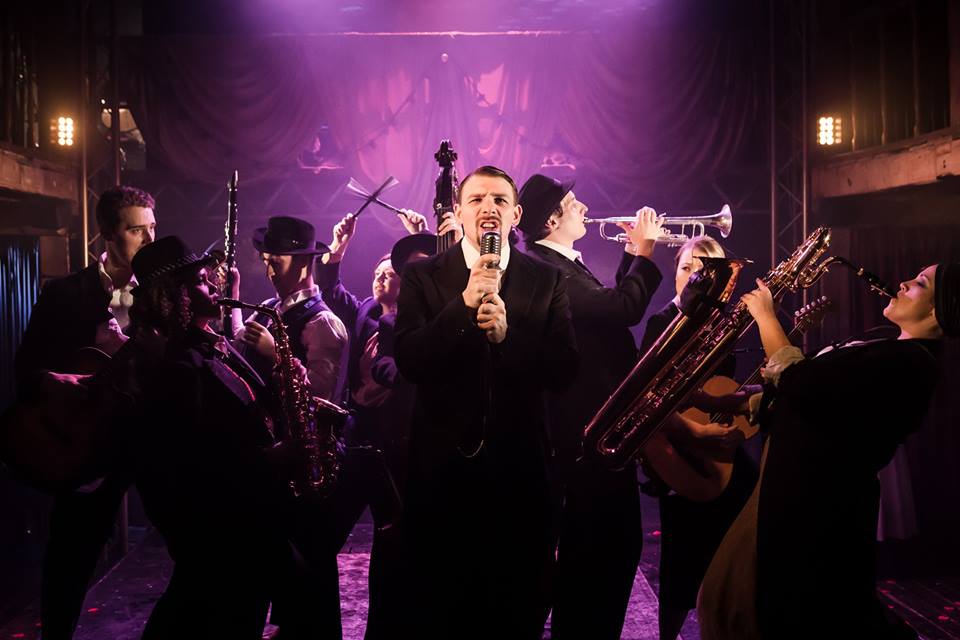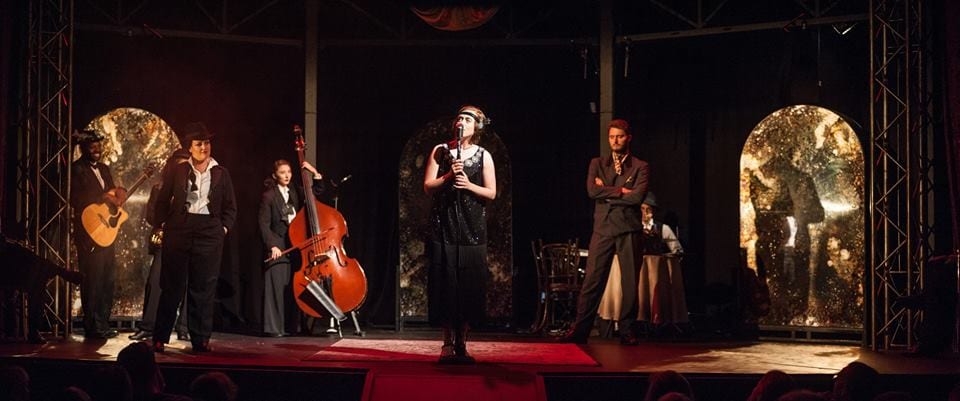Twelfth Night is a Shakespearean comedy, which is a classification that doesn’t appeal to the casual theatregoer; the most disparaging attendees assume the play will be a musty series of esoteric jokes. However, the bard’s masterful writing often just needs the right director to bring out its shine, and Hart’s production has succeeded in helping Twelfth Night dazzle. Hart has wrenched the story centuries forward, adapting it into a fun Roaring Twenties romp full of brassy charm and humour.
The narrative of Twelfth Night begins with a shipwreck. Twins Viola (Rebecca Lee) and Sebastian (Stuart Wilde) survive the ordeal, but each believes the other is dead. Viola disguises herself as a boy called Cesario and works as a page in the service of the lovesick Orsino, Duke of Illyria (Jamie Satterthwaite). She is employed to help woo Olivia (Aruhan Galieva), a rich countess who Orsino is infatuated with. However, as Viola (playing Cesario) delivers hyperbolic speeches on behalf of the Duke, Olivia becomes attracted to Viola’s boyish looks. Meanwhile Olivia’s alcoholic uncle, Sir Toby Belch (Lauryn Redding), offers a suitor into mix: the pathetic fop Sir Andrew Aguecheek (Mike Slader). There is a subplot with Olivia’s attendants and Sir Toby Belch as they trick Olivia’s steward Malvolio (Peter Dukes) to believe his mistress is in love with him. The play ends with a reunion of the twins and a resolution to the love tangling. Matches are made, but the disgruntled Malvolio cuts through the happy thrust of conjugal affection, vowing to have revenge on the pack of them.
The 1920s setting has thematic currency for Twelfth Night. The use of jazz and a live band works well in styling the music-loving party animals against the anti-musical spoilsport Malvolio. There are some wonderful covers of pop classics, such as ‘Mad World’ by Tears for Fears, which leads neatly into Orsino’s line “If music be the food of love, play on”, and ‘Royals’ by Lorde, which is sung in a deliberately pompous manner by Malvolio. The stage design is economical yet marvellous: it is made aesthetically pleasing by the Gatsby-esque champagne coupes and scattered rose petals. There is certainly a danger of obstructing the text with all this design alteration, but Hart has successfully avoided this pitfall. The Roaring Twenties nostalgia never feels laboured: these characters are simultaneously modern and Shakespearean. Belch is a Falstaffian glutton who runs his own speakeasy from his well-stocked coat pockets. Malvolio is a ridiculous fool who later humiliates himself by emerging from behind a screen as a yellow-stockinged Weimar tart. The setting works to accentuate the jokes and doesn’t distract from them, which is what makes Hart’s production audacious and vibrant.
Having experimental directors of Shakespeare such as Hart is crucial. In other news about Shakespearean directing, it has recently been announced that Michelle Terry will take over Emma Rice as artistic director of the Globe. Rice’s two seasons have been fraught with board disputes and ongoing tension between traditional and experimental interpretation of Shakespeare. It is a shame to see that Rice will leave the Glove after a rather short career, since it seems that her wings have been clipped. However, Terry promises an exciting new reign in the Globe’s history. Ian Rickson terms Terry’s appointment “a real breath of fresh air” and Michael Billington notes that she has “a vibrant presence, a fierce intelligence and a profound understanding of Shakespeare’s language.” I believe that Hart possesses a similar energy. Hart’s own profound understanding of the bard’s language is evident in the effervescence of his reinterpretation.






